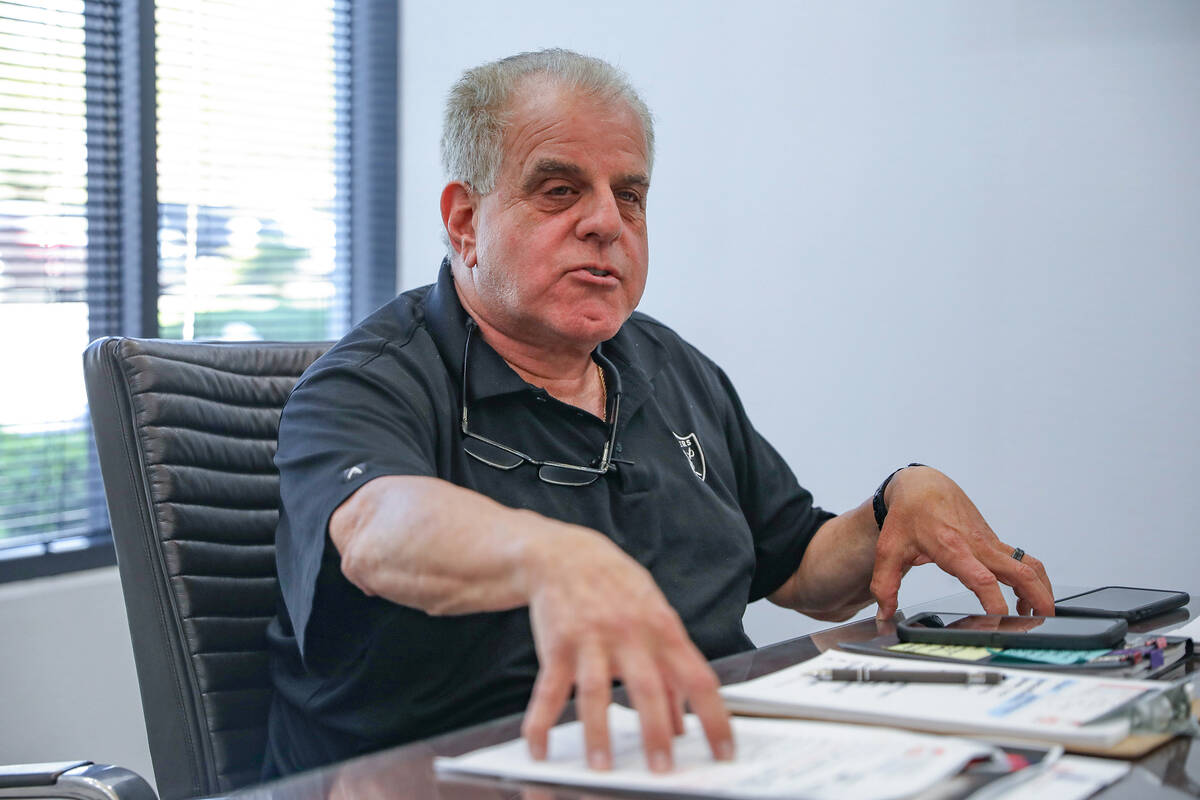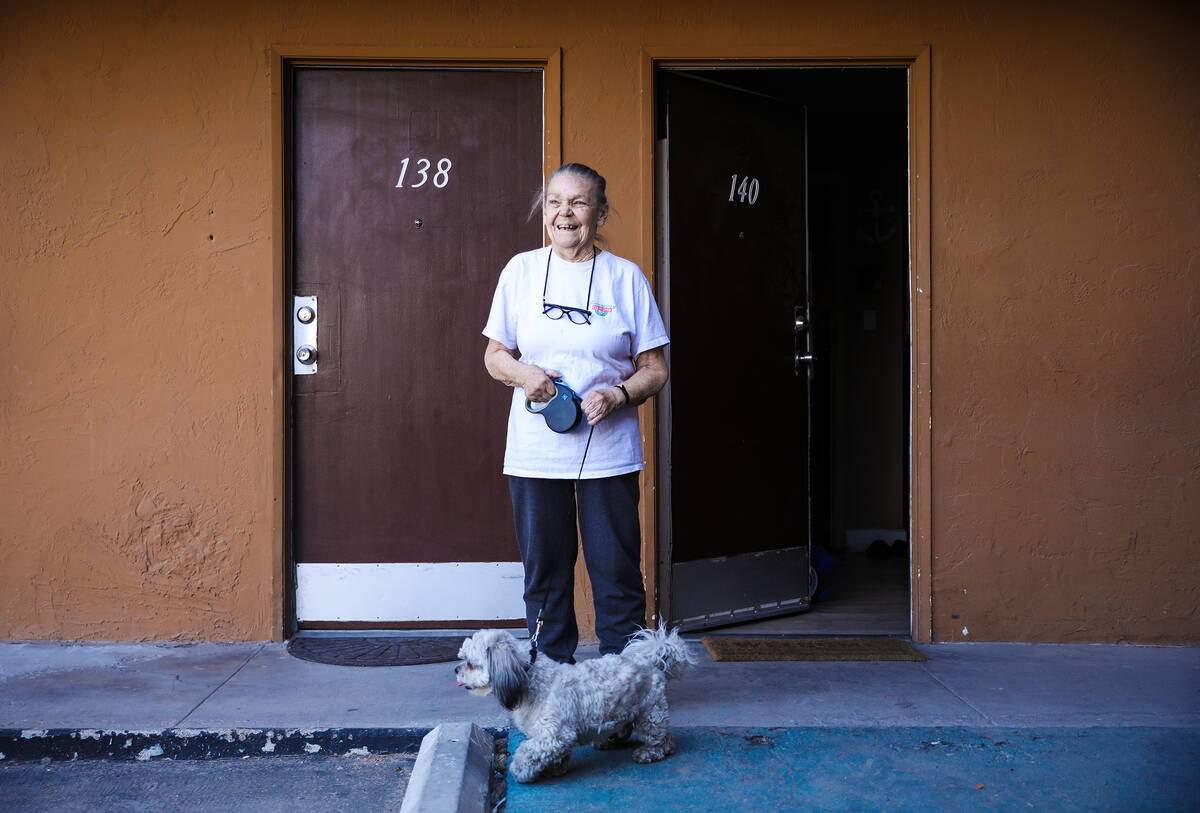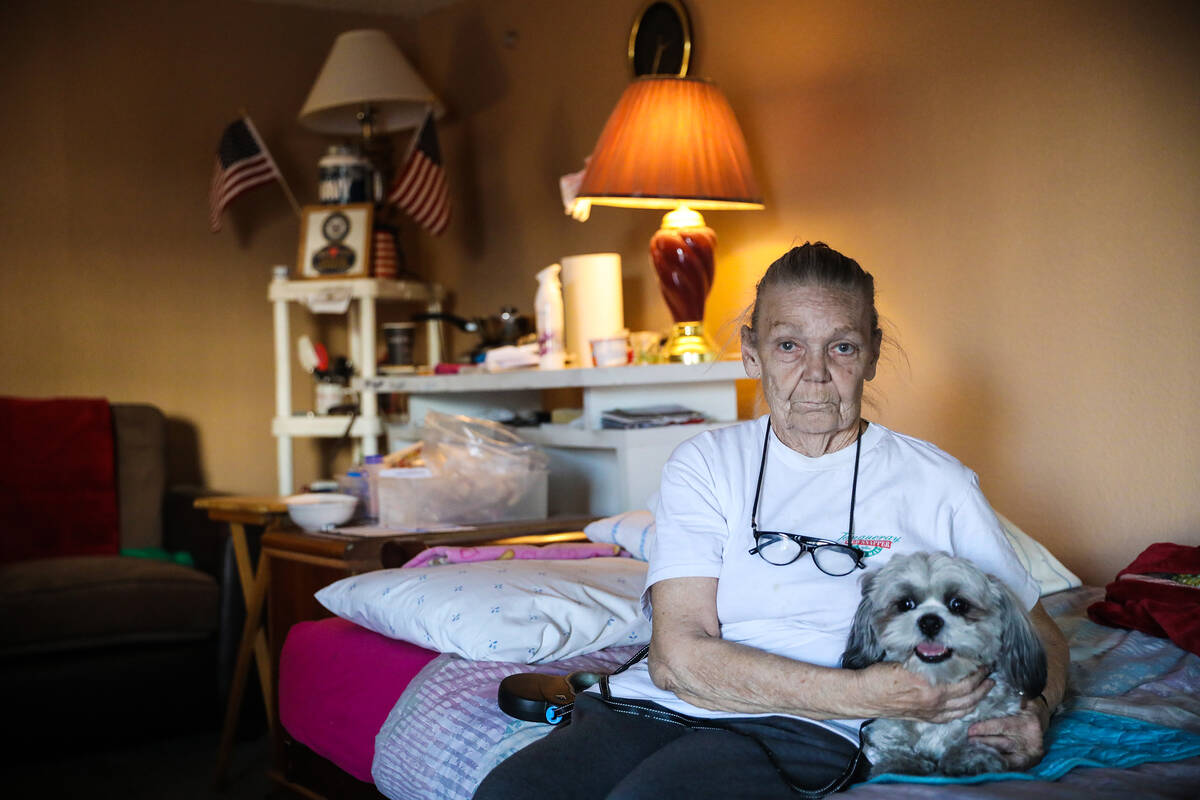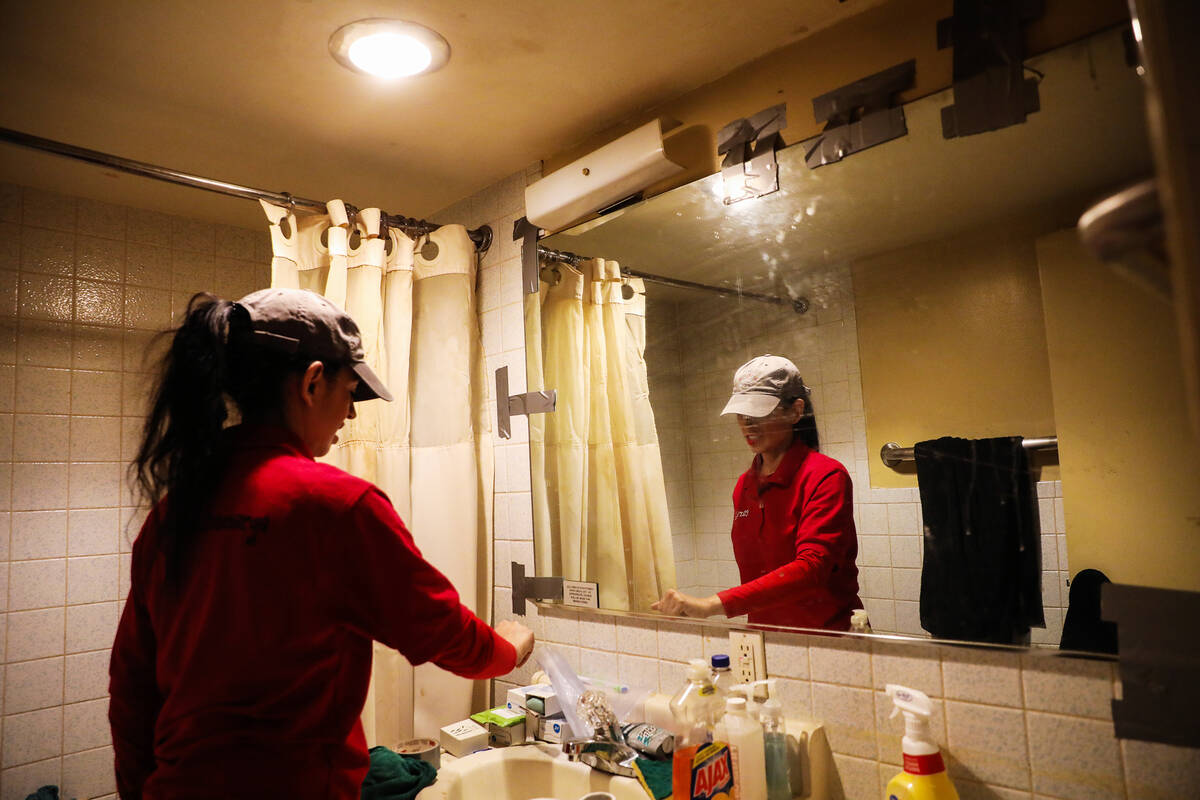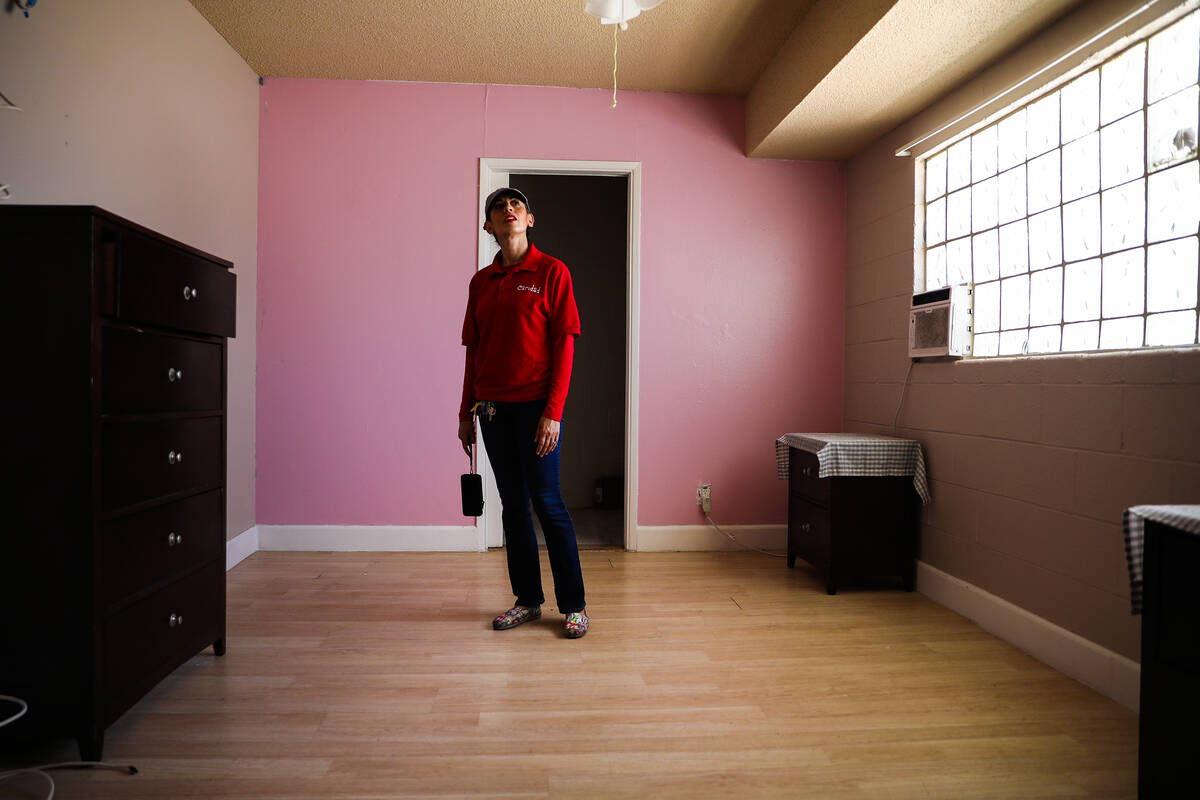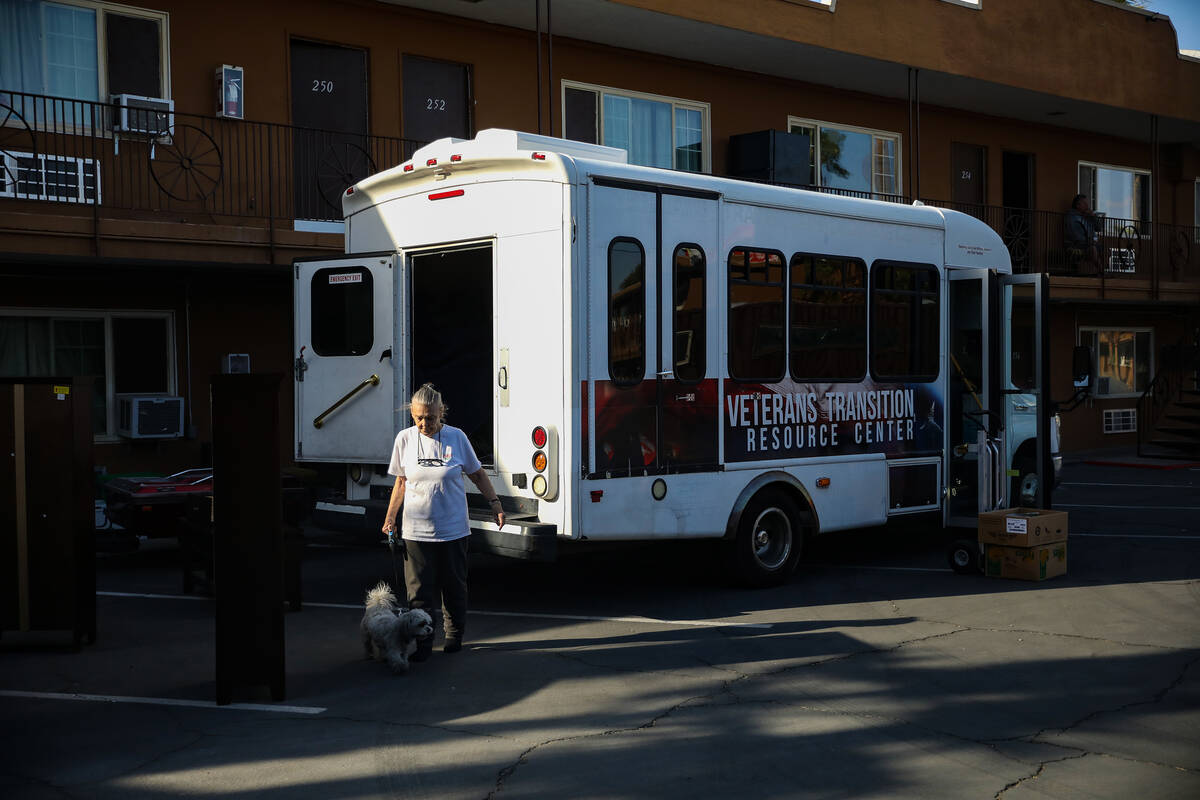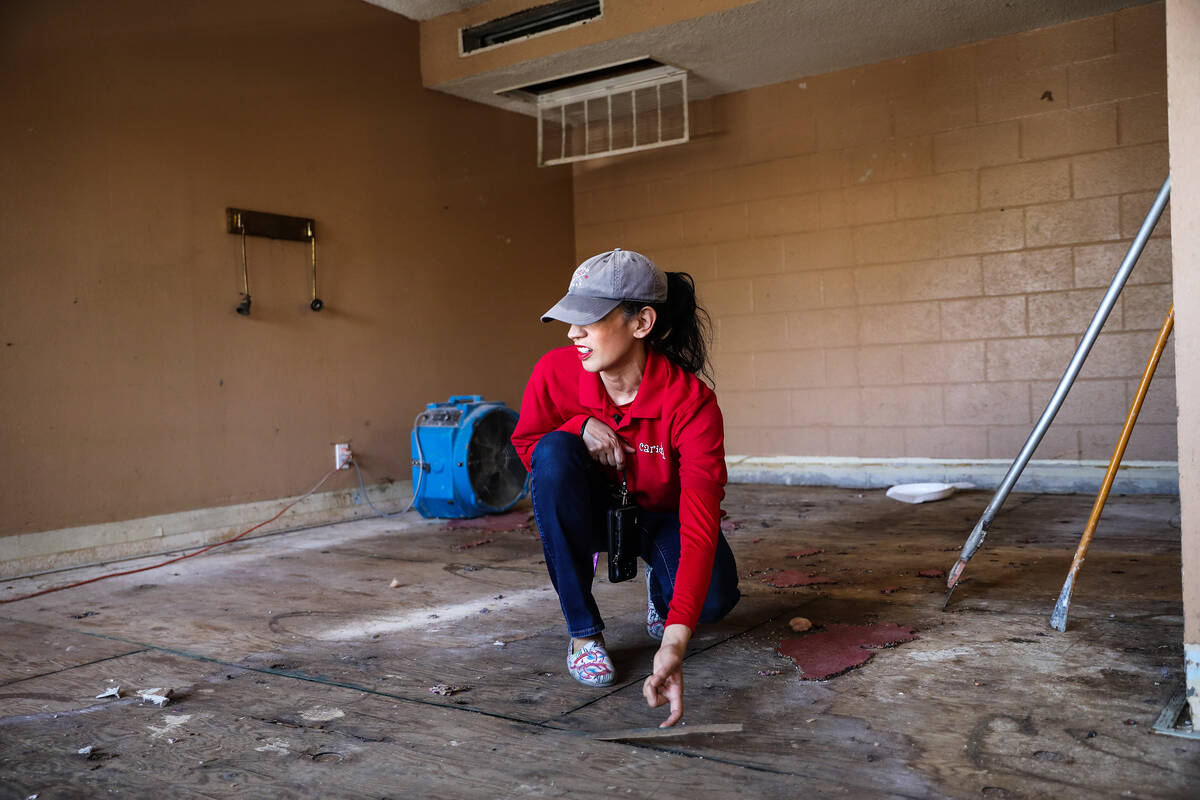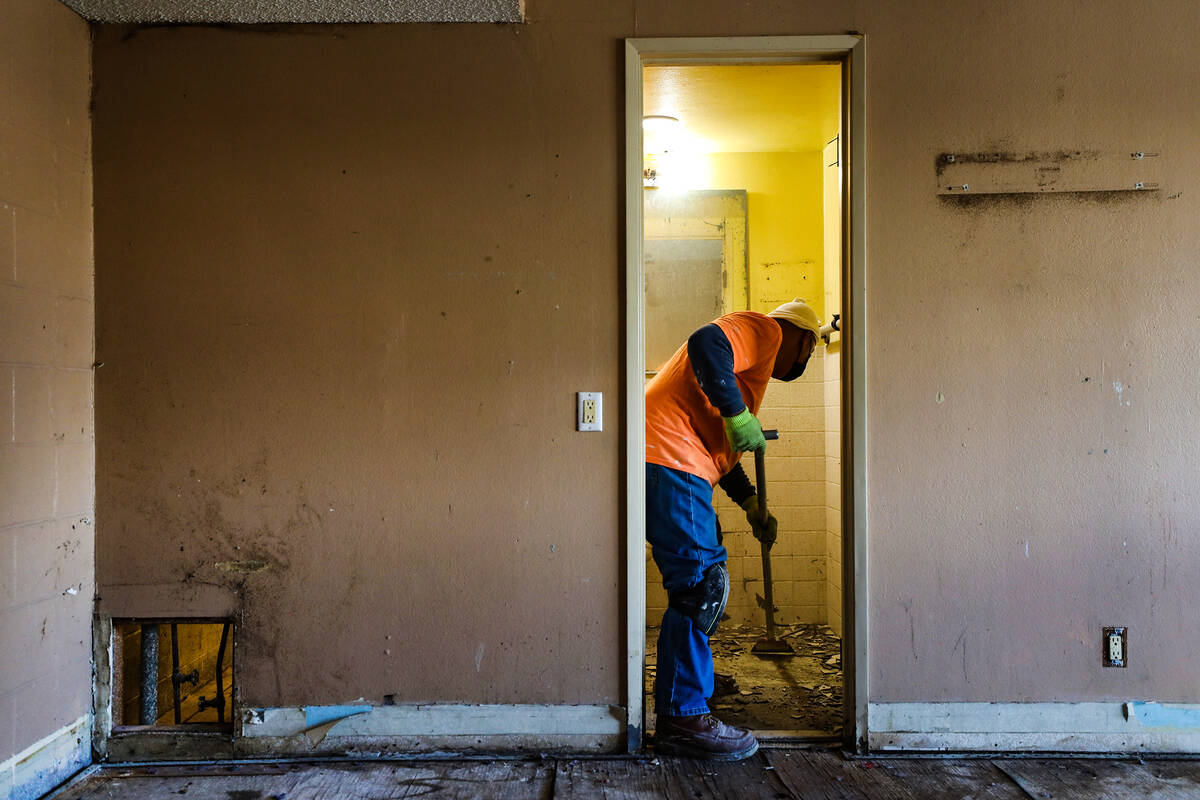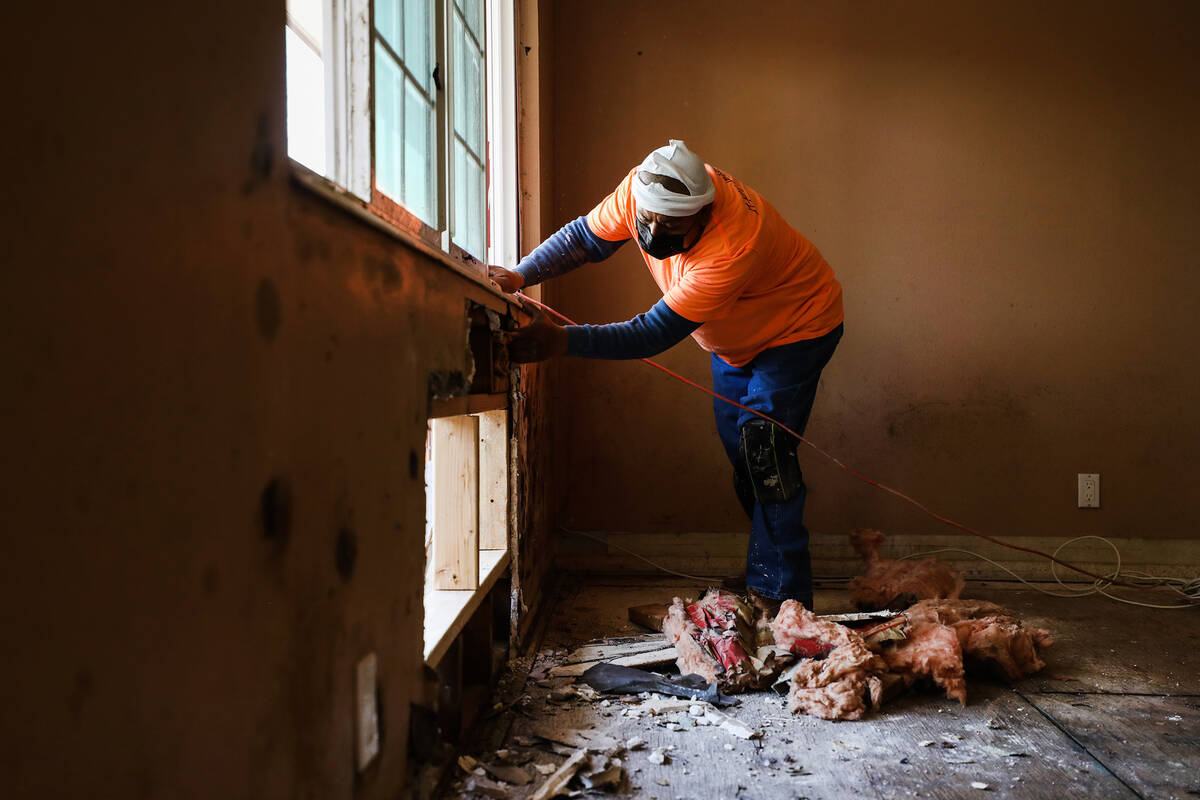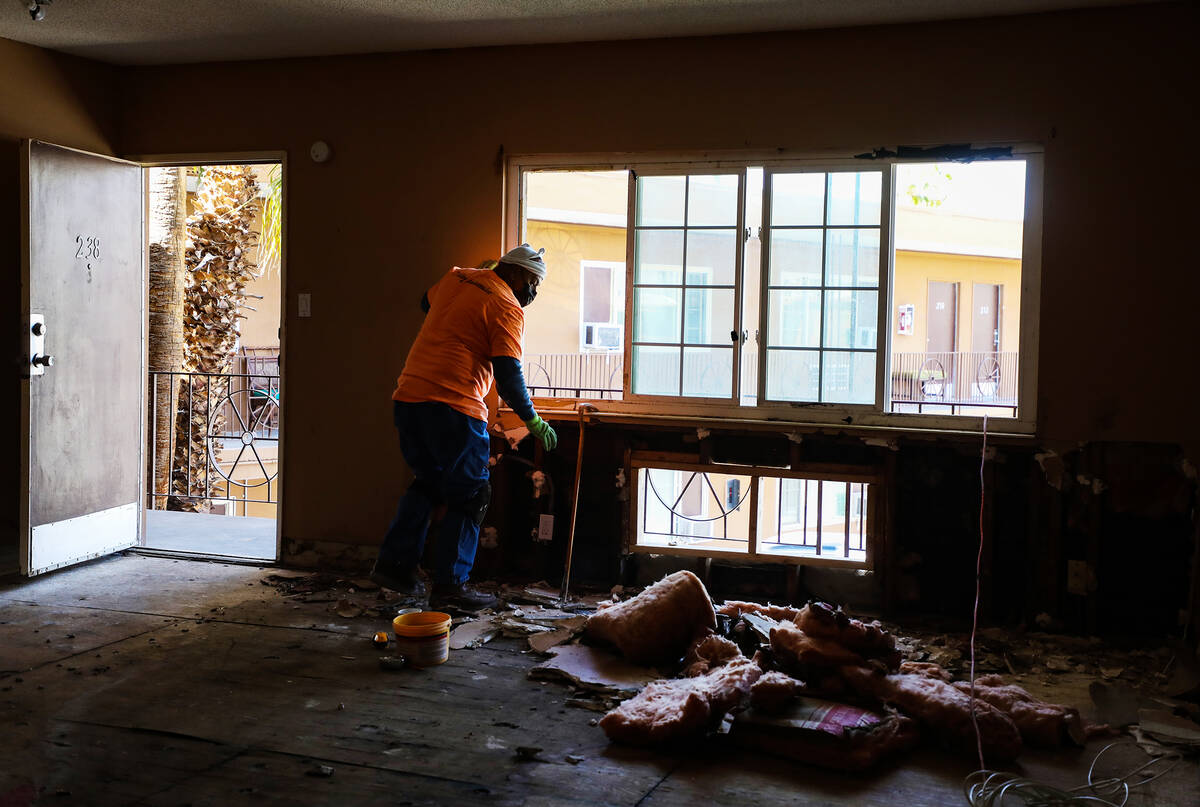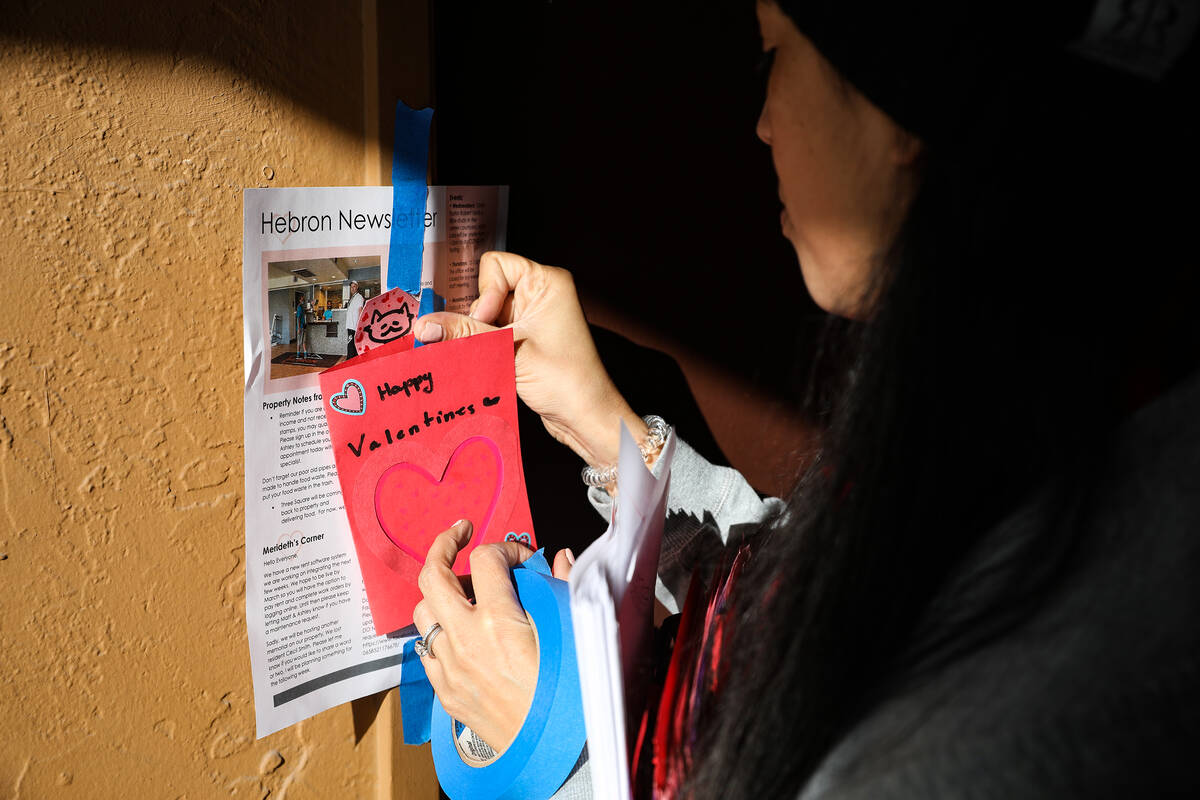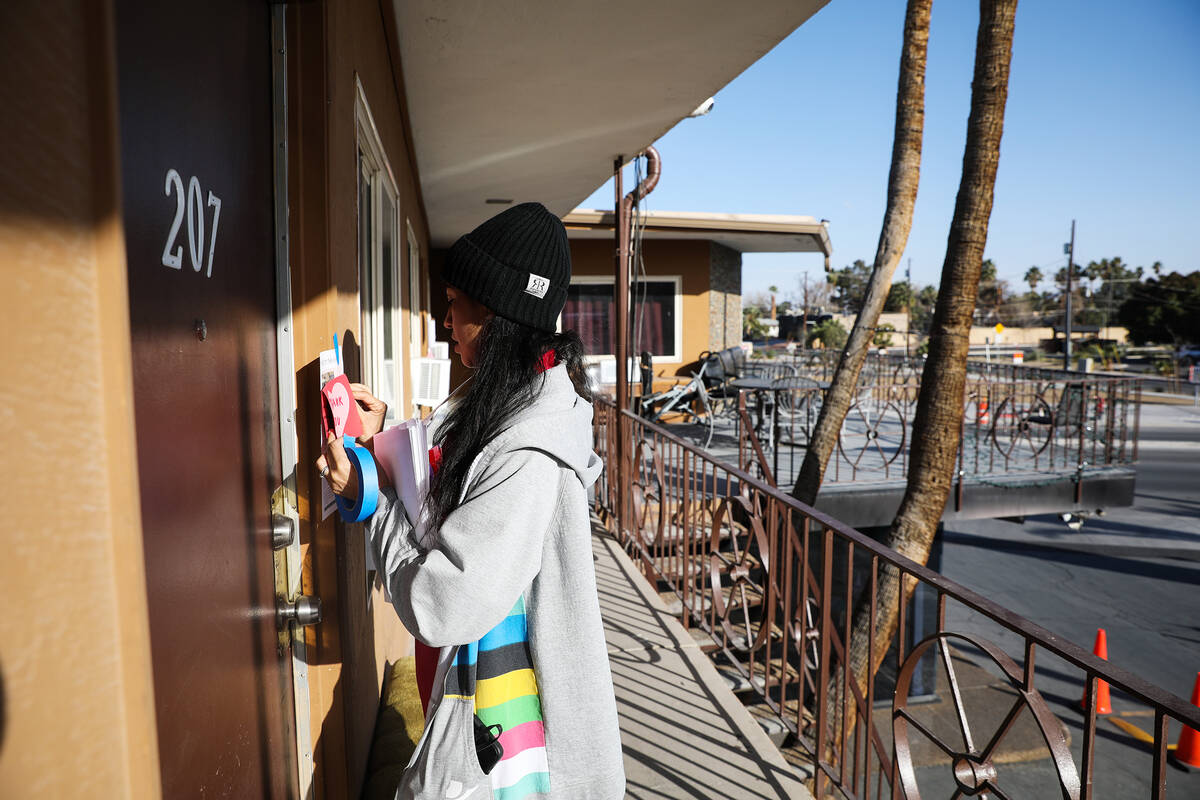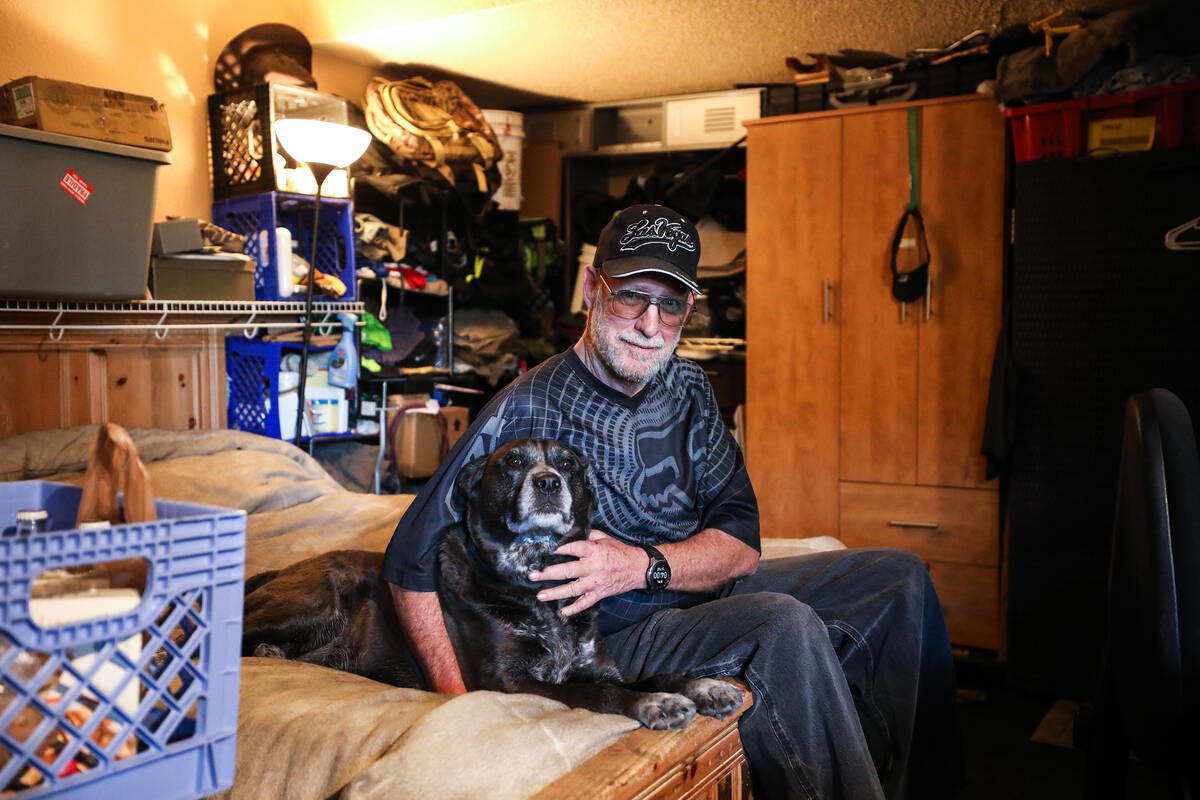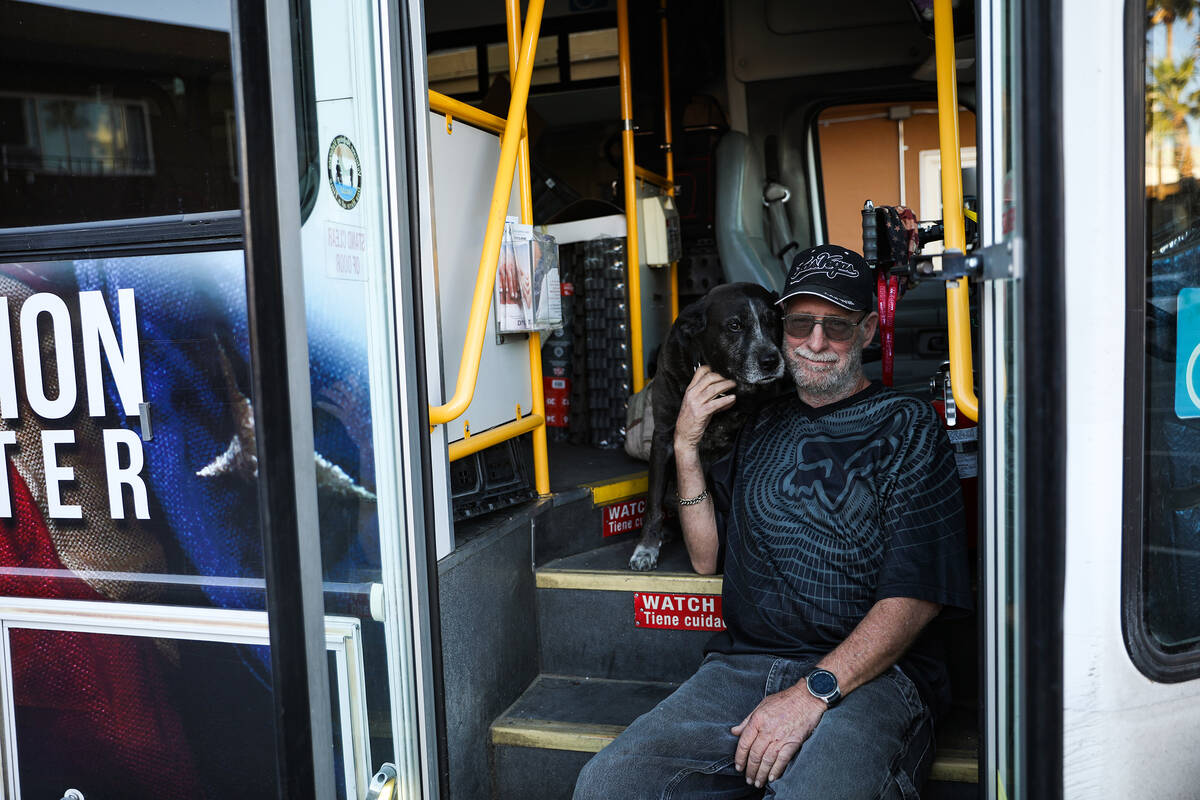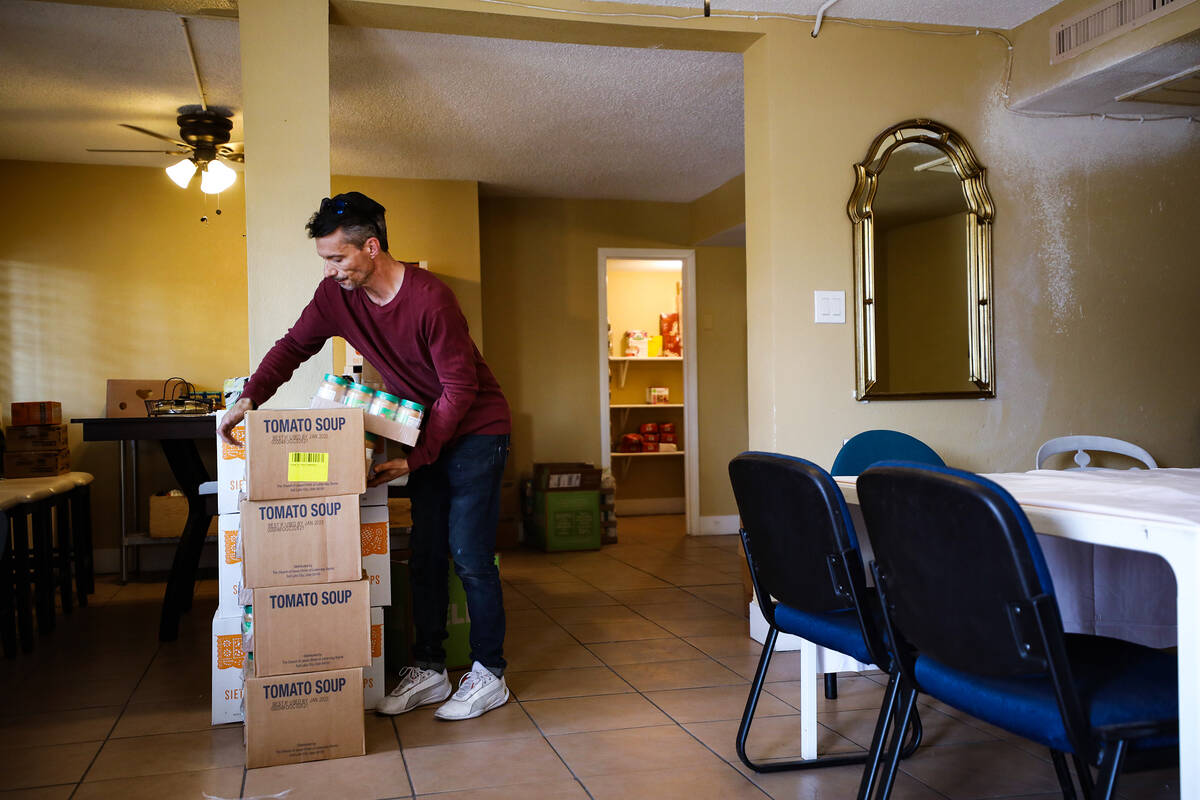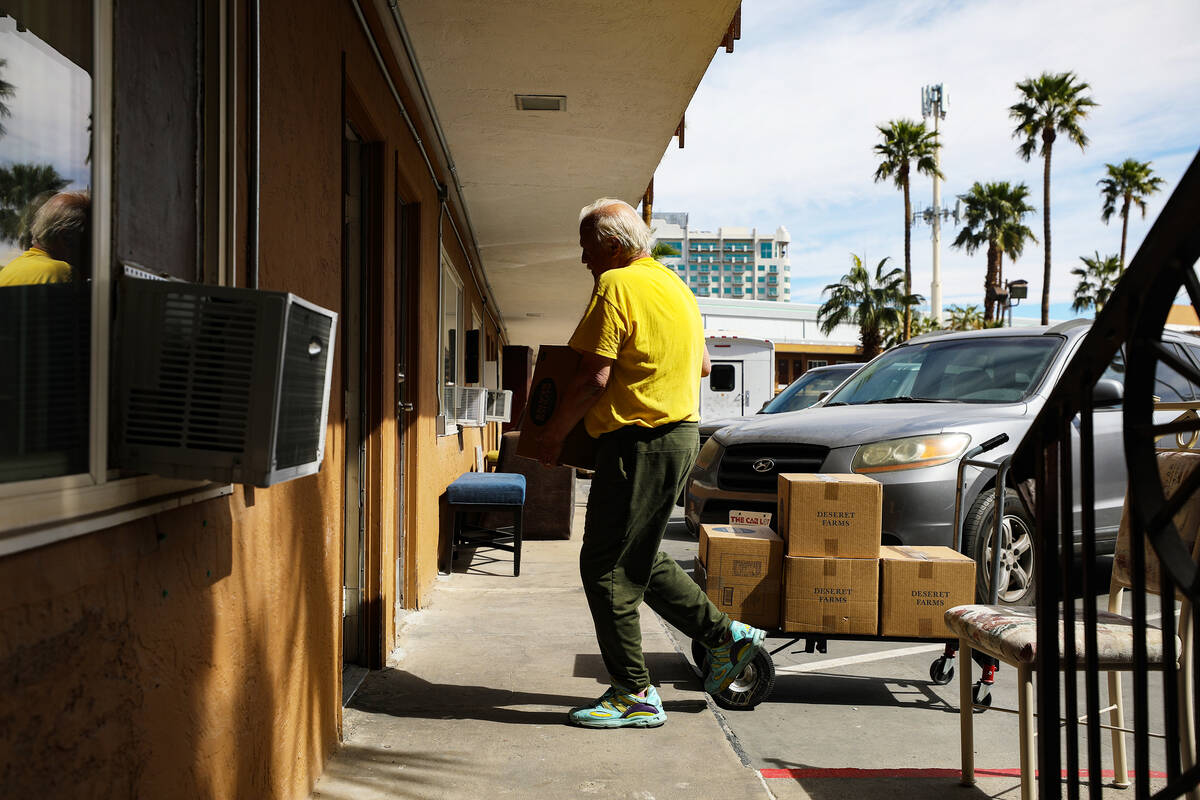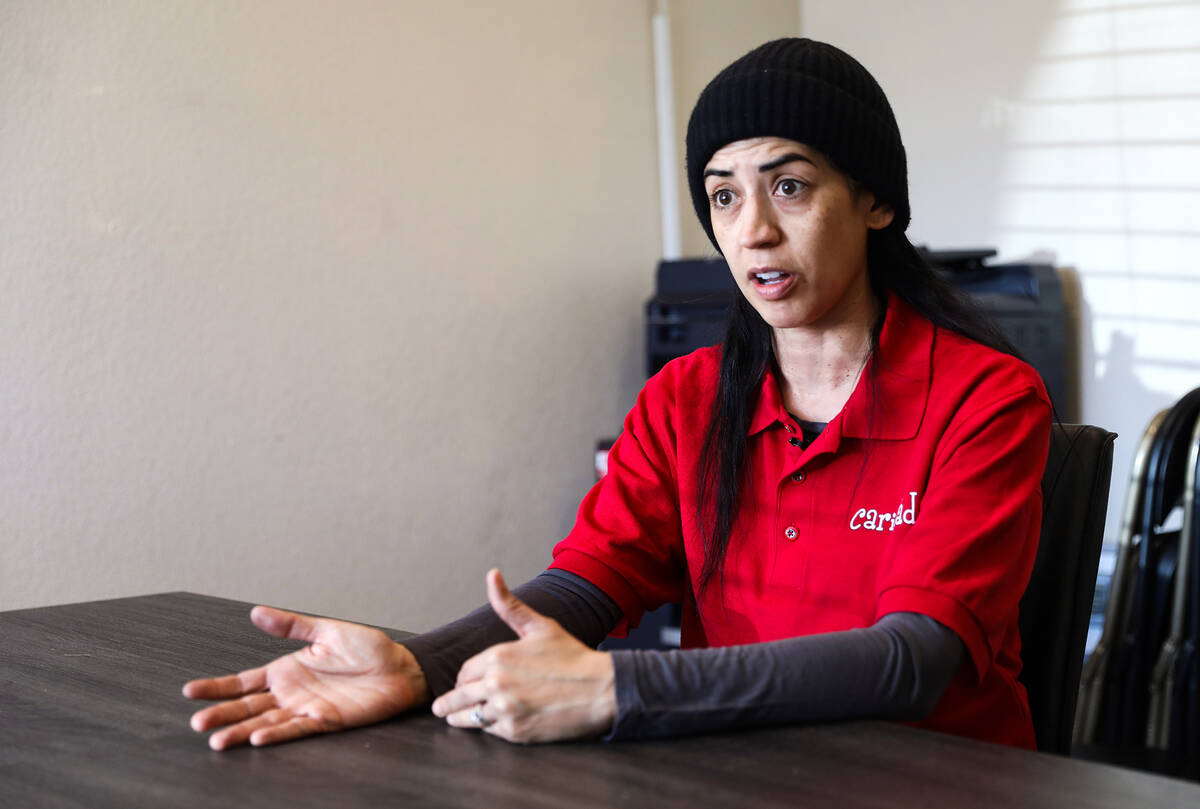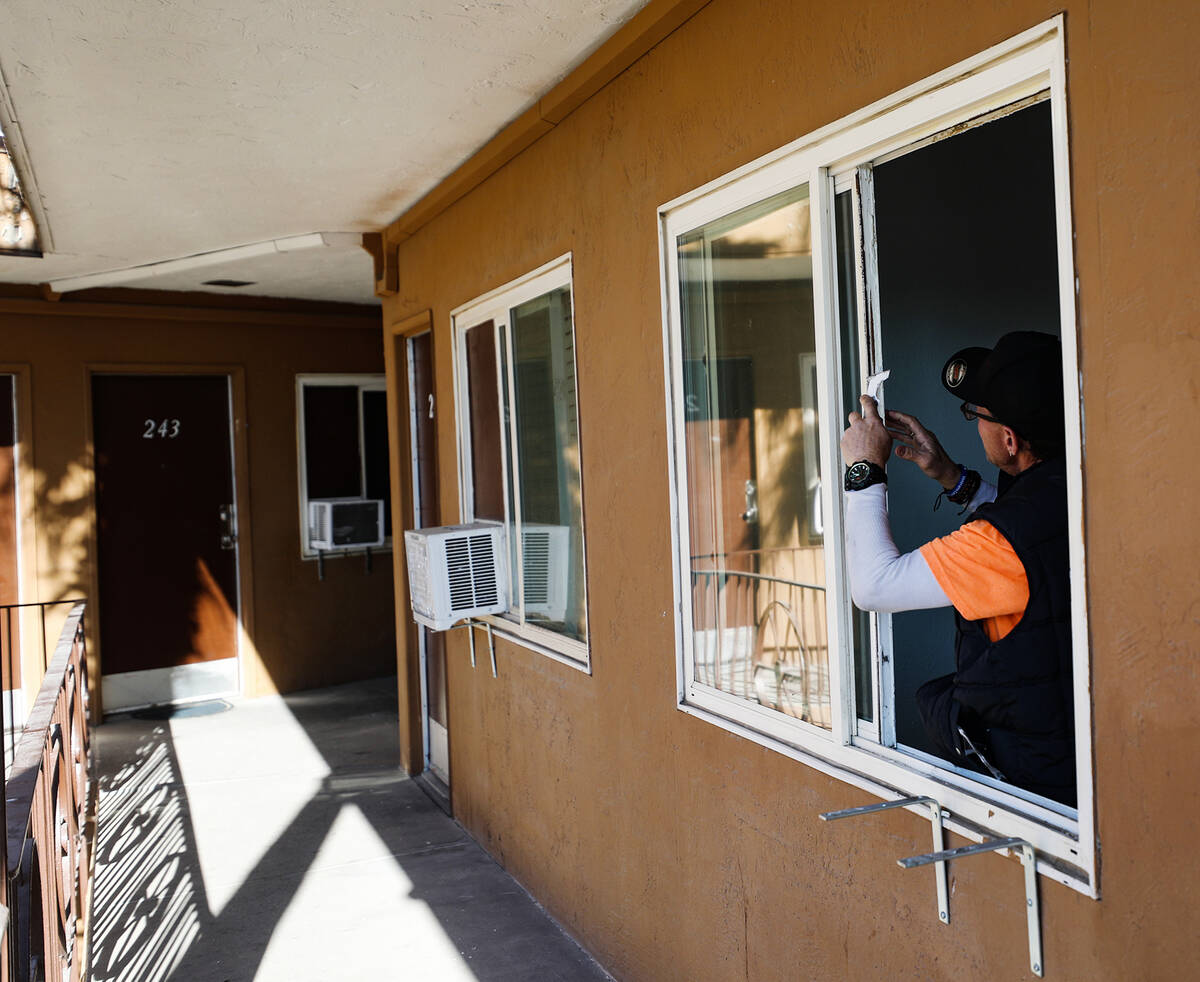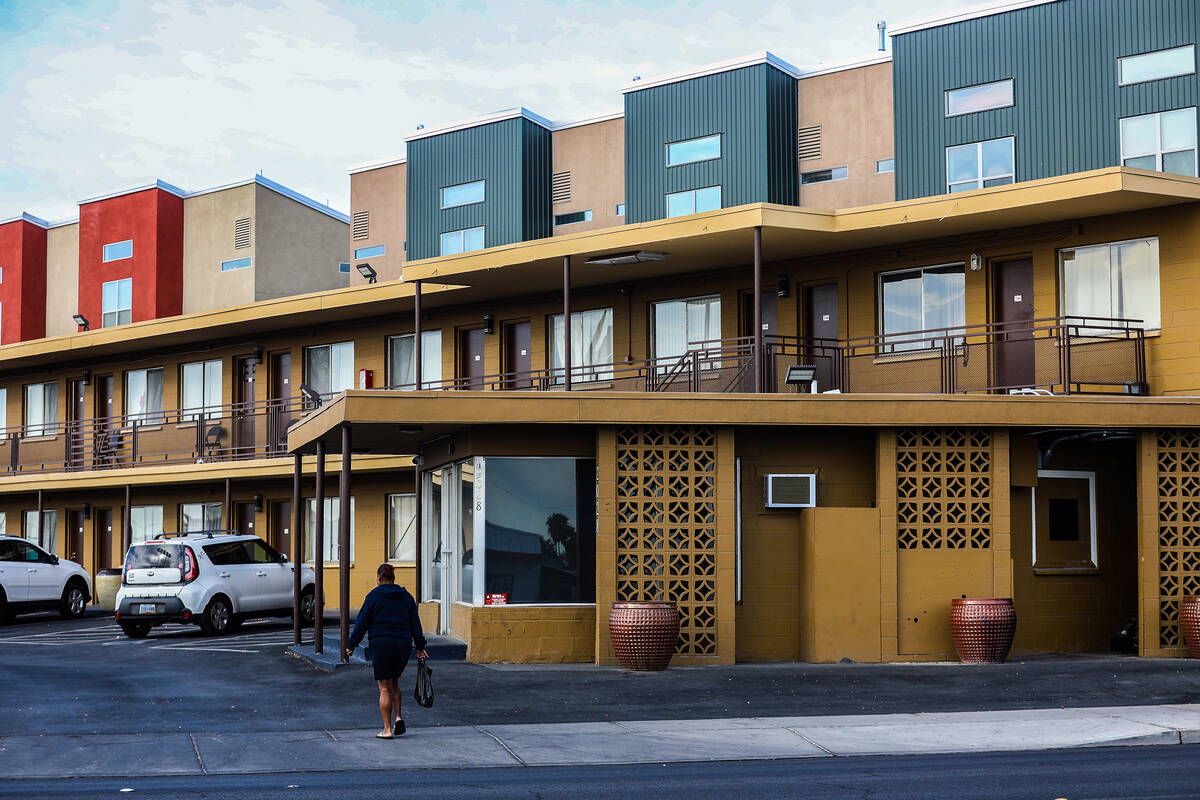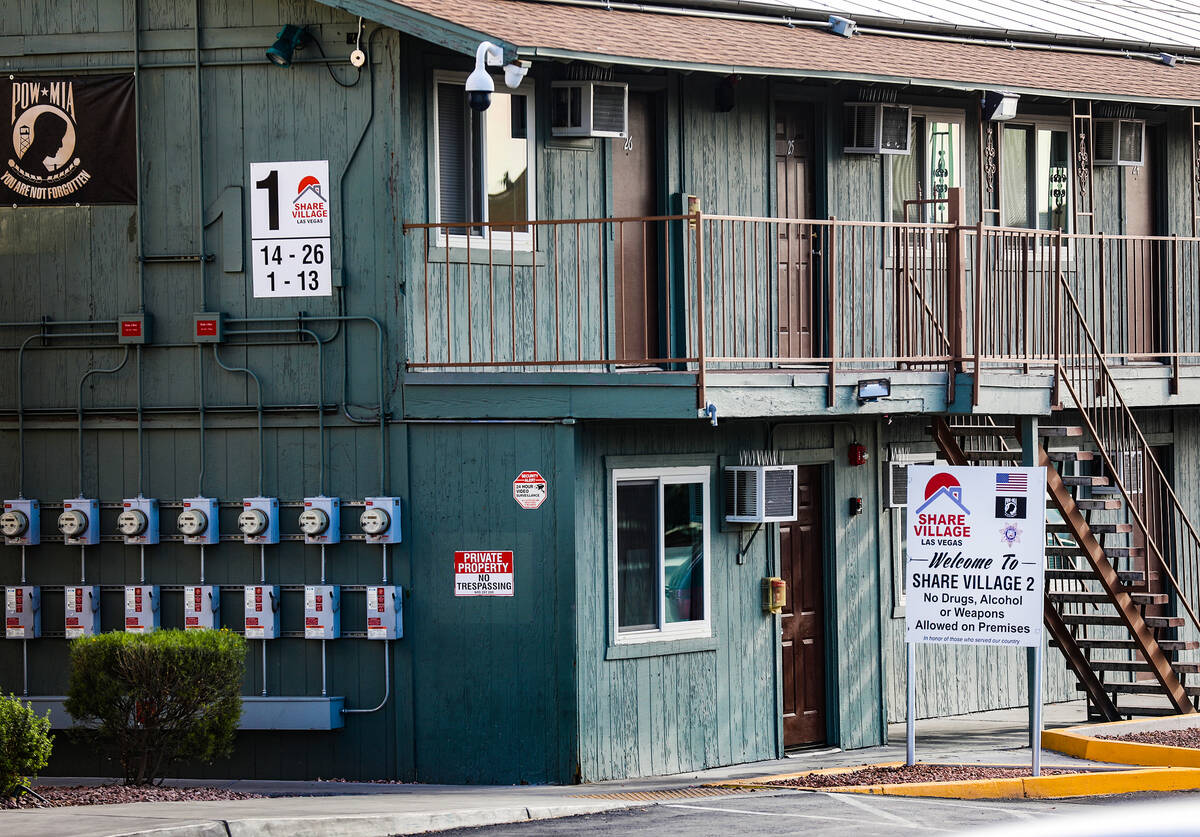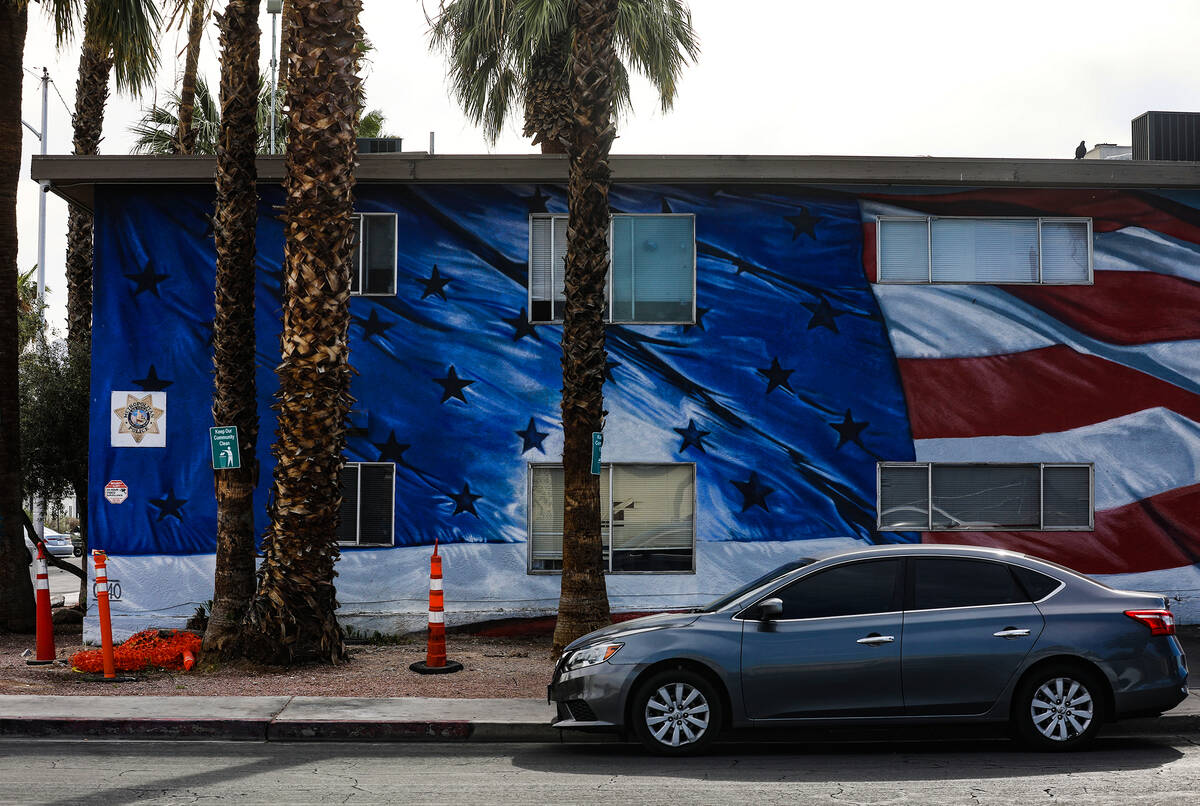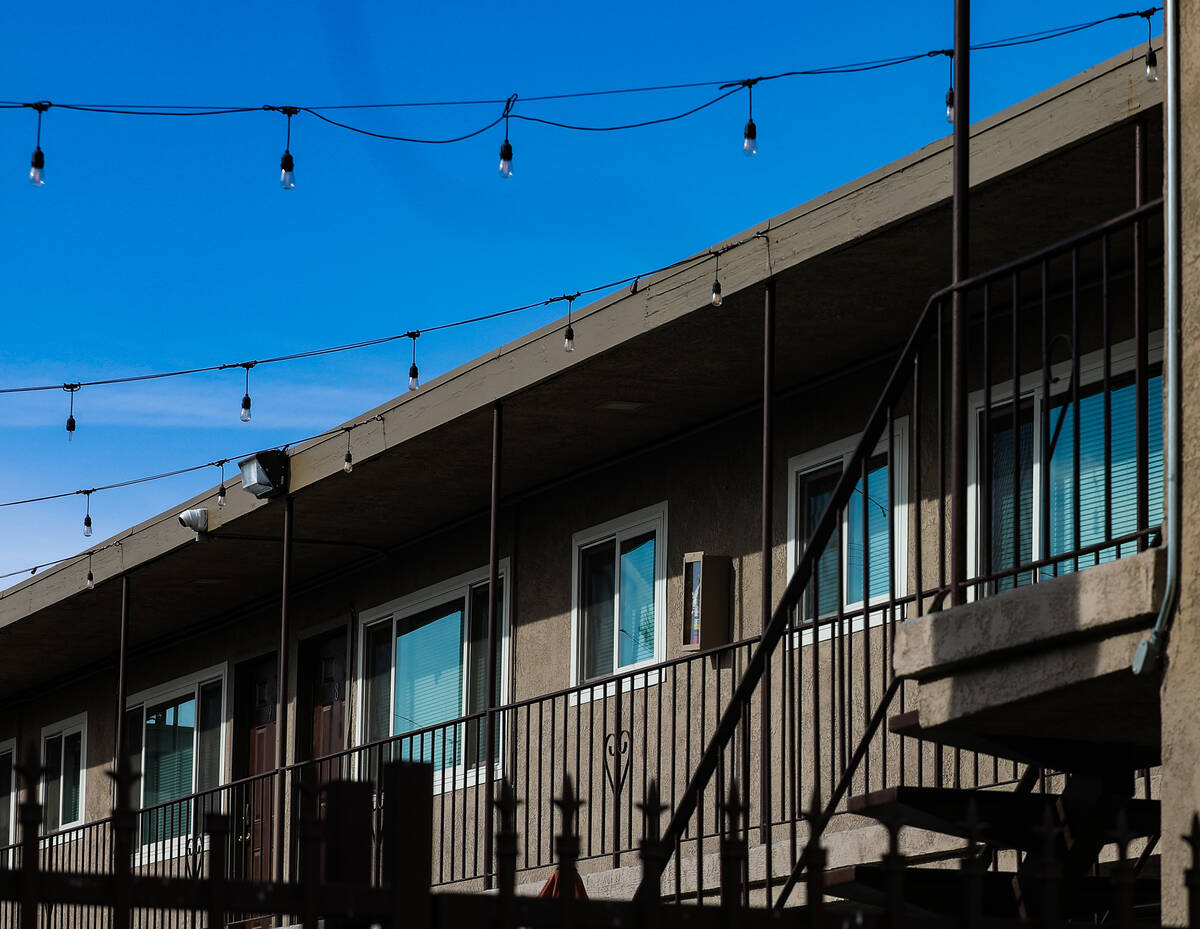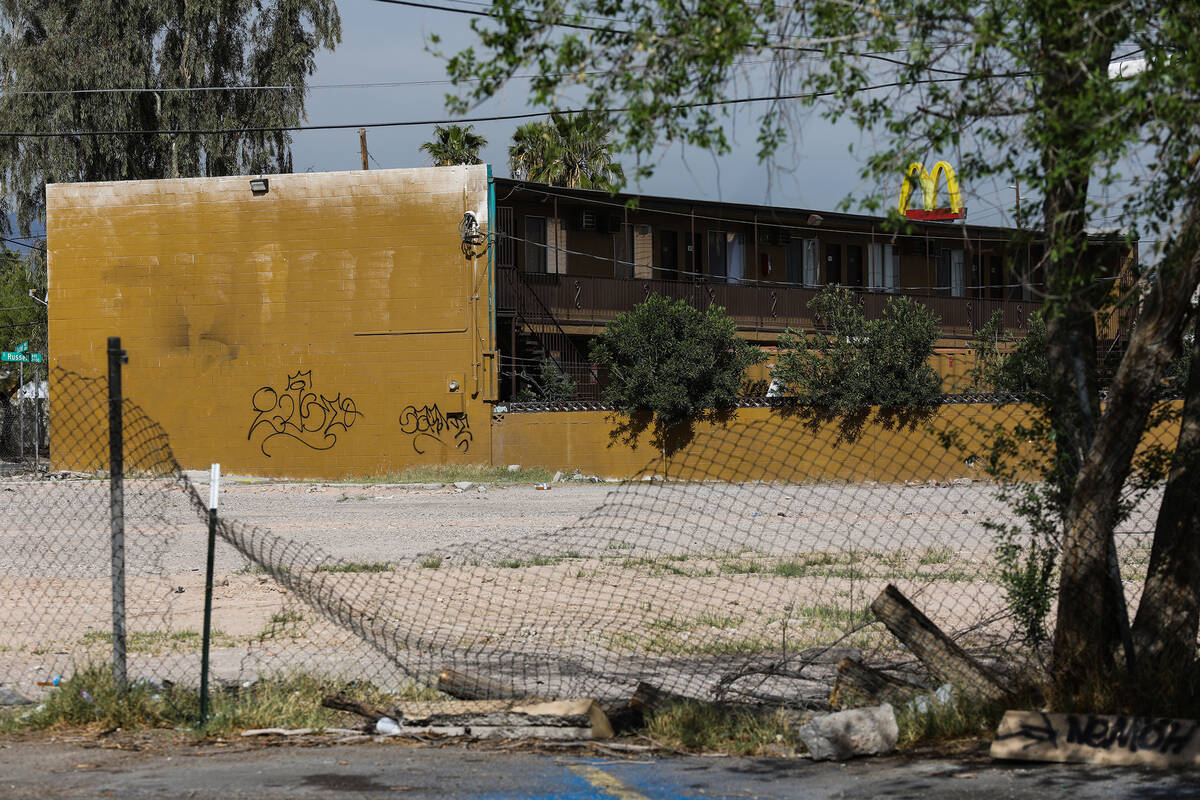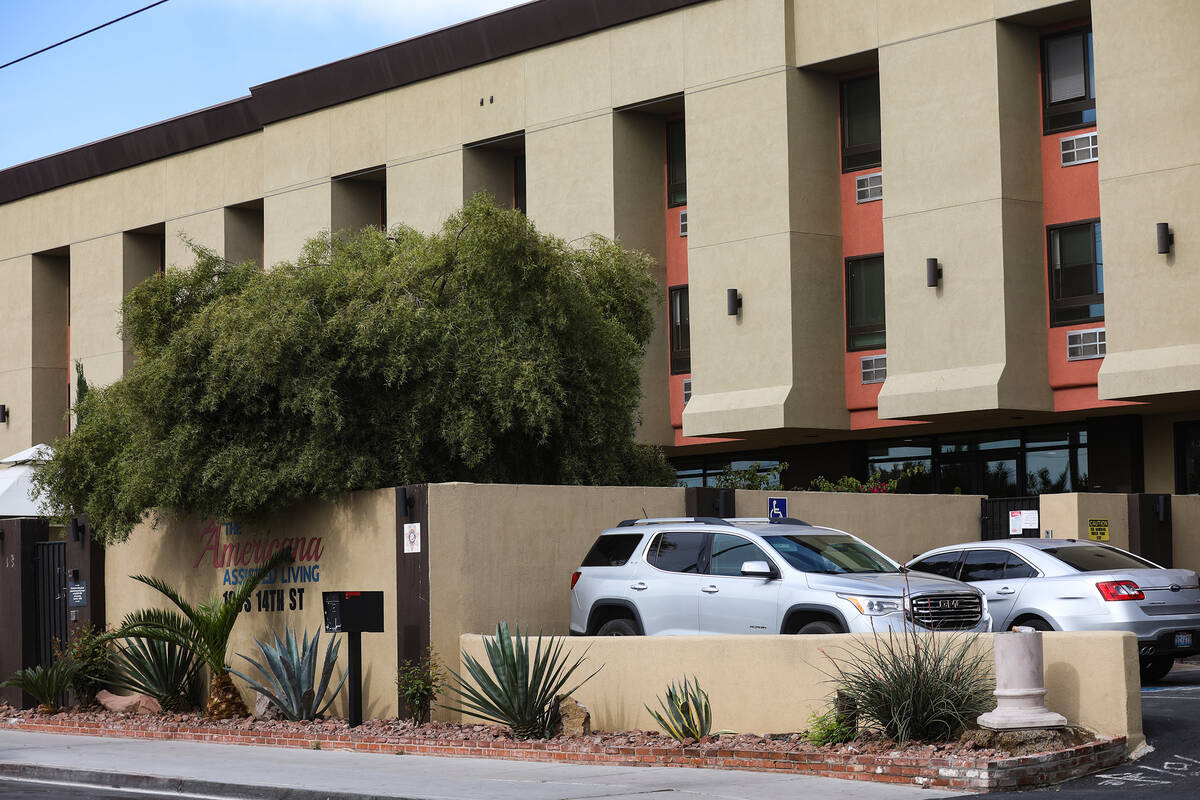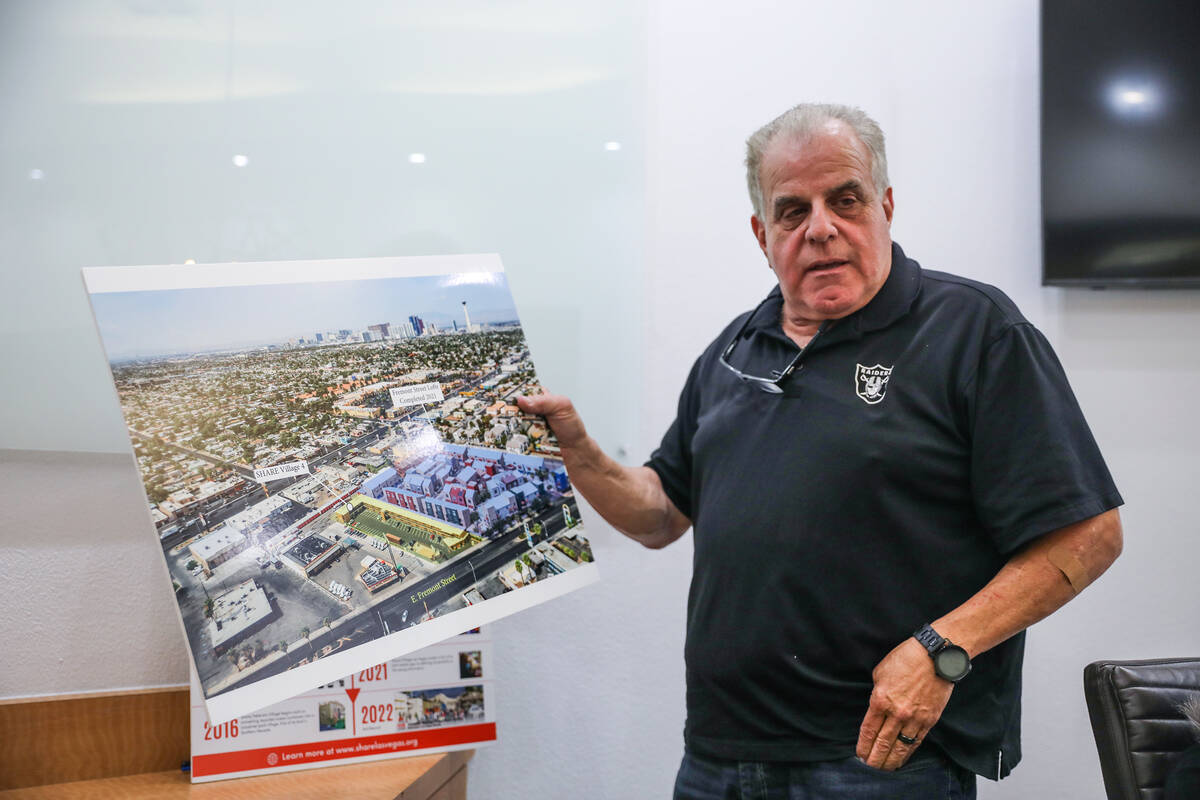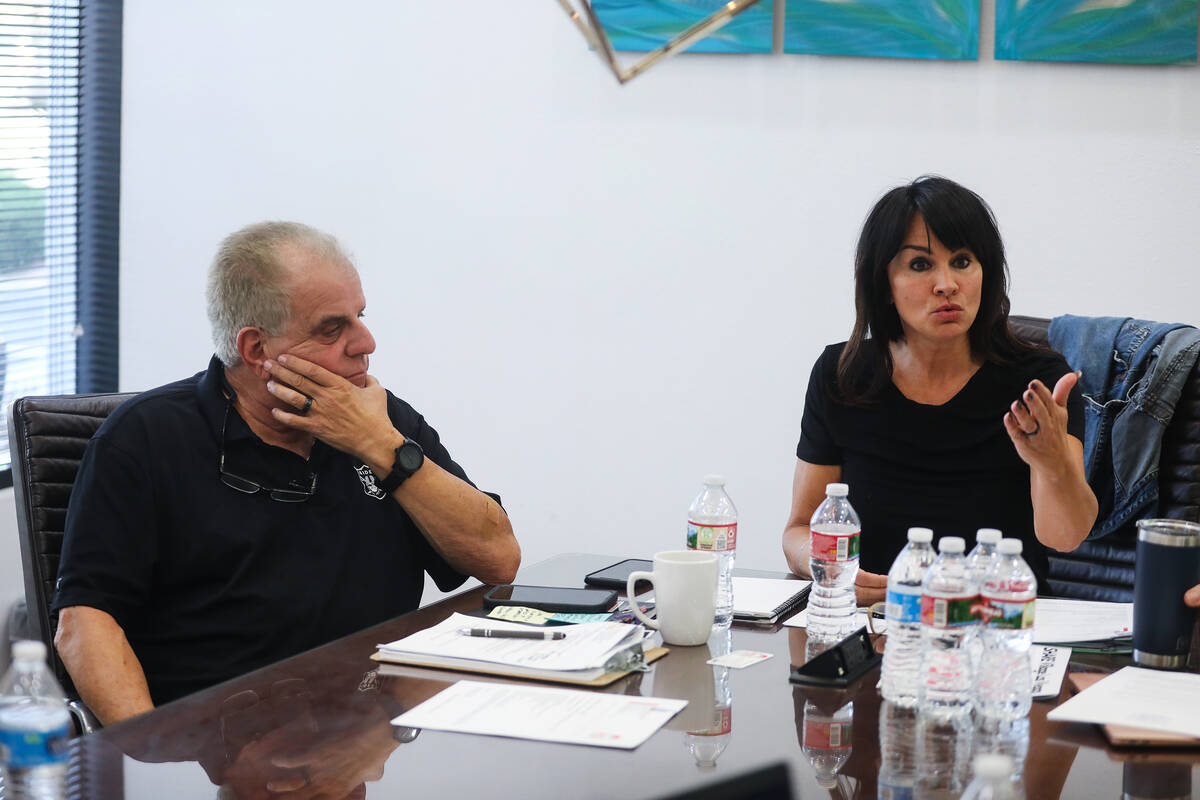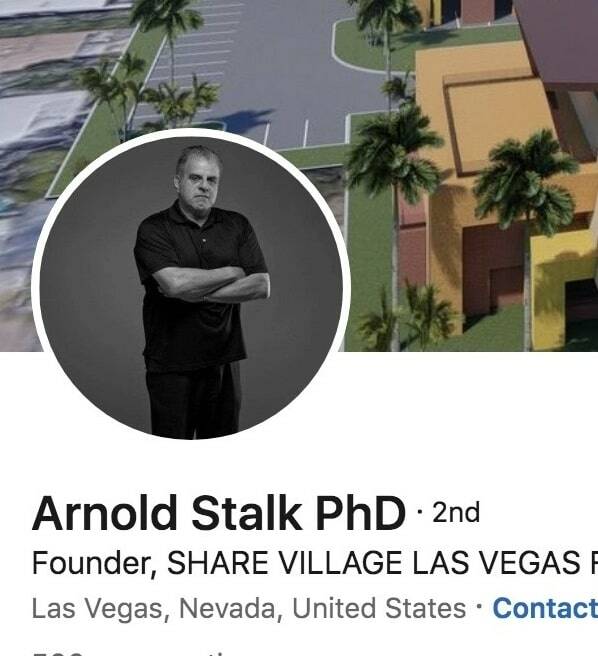Vegas charity leader had lofty goals. Now his nonprofit faces scrutiny, complaints.
Arnold Stalk built a reputation over a decade for his charismatic appeals to help the homeless and low-income veterans in Las Vegas.
But allegations of poor upkeep at his first housing complex, where tenants complained of substandard conditions despite millions poured into it, have brought scrutiny to his nonprofit, SHARE Village. SHARE abandoned management at the flagship property in September, resulting in a lawsuit. Stalk then listed three other complexes for sale, raising more concerns about the charity’s stability and obligation to vulnerable populations.
Once called Veterans Village, Stalk’s operations are funded through public and private donations and rent. The city of Las Vegas alone awarded him $2 million in taxpayer-funded loans for building purchase and renovation.
But tenants at the flagship property have told the Review-Journal that they endured living in rooms with cockroaches, leaking pipes and stained mattresses.
“It’s just grotesque,” said one resident, 71-year-old Bobbye Sexton. “This is supposed to be a trusted man for humanity.”
In response to tenant allegations, SHARE attorney David LeGrand said in a statement the property passed federal housing inspections for 11 years and that necessary repairs were made as effectively and efficiently as possible.
Stalk claimed in an email to a county official in September that he “procured millions of dollars into improvements for the facility” — a 123-unit apartment building in downtown Las Vegas — but LeGrand declined to provide documentation of renovations made, calling the matter irrelevant.
He also said the nonprofit that took over property management, Caridad, signed a lease in November and accepted the building as being in “good order” and “satisfactory condition.”
During an interview, Stalk said he was proud of his efforts to turn former rundown motels into low-income housing. At its zenith, SHARE operated six properties totaling more than 500 units.
“We’re not a shelter; we’re the solution,” Stalk said. “We can have 10 SHARE Villages, and it’s not going to be enough to meet the demand.”
In September, SHARE abandoned operations at its first complex during the middle of its lease. Residents were left unsure whether they would remain housed and scrambled to collect their security deposits for months. The building’s owner, YSBM Investment LLC, sued SHARE, alleging it owed them unpaid rent and taxes.
“I’ve never abandoned anybody in my life, especially a United States veteran, a homeless family, are you kidding me?” said Stalk, who gave two weeks’ written notice to the owner and a week’s notice to tenants. “I’m at peace with how we handled our affairs.”
However, SHARE’s operations have diminished, leaving some community leaders concerned as Southern Nevada faces an estimated housing shortage of more than 80,000 units. Since 2020, the nonprofit has sold two of the five apartment complexes it owned. In January, it listed the remaining three for sale, before suddenly pulling back the listings in March.
“Whenever you’re losing one of those properties, those people have to go somewhere,” said Aaron Sheets, director of operations for the housing nonprofit Hopelink of Southern Nevada. “And where’s that going to be?”
Downsizing at SHARE
SHARE’s portfolio is centered around downtown Las Vegas, clustered together to create a village model blocks away from the city’s Arts District. The pedestrian-heavy area, which is often bustling with traffic and construction, is frequented by many of the city’s homeless, disabled and low-income populations who utilize the nearby convenience stores and bus stops.
The bulk of rent payments for many SHARE residents is subsidized by either government agencies or other nonprofits. And SHARE Village 2, at 50 N. 21st St., is the operation’s hub. Tenants from multiple properties frequent the complex to get their mail, receive social services from local agencies and pick up groceries donated by the Three Square food bank.
The status of the charity’s three remaining buildings has been in flux: They were being offered for a combined $32 million, according to a now-deleted listing posted by the Powers-Armstrong real estate firm.
In an email obtained by the Review-Journal, firm broker Mark Bennett claimed the properties’ new owner would be “not obligated, legally or otherwise,” to continue operating them as affordable housing.
If the buildings cease to operate as affordable housing, Stalk would need to repay the $2 million the city of Las Vegas loaned SHARE in 2016, a city spokesman said.
But the posting was removed in late March after the Review-Journal began asking questions about the potential sale.
Stalk — alongside his wife and nonprofit co-founder, Shannon Kelly — now asserts that they will continue operating the properties with Stout Management.
“We feel very confident that they can run the day-to-day, and we can do the nonprofit side,” Kelly said.
The downsizing of operations, including hiring the property management company, was necessary as Stalk battled ongoing health issues after contracting COVID-19 in 2020, they said.
Stalk’s decision to continue operations is a stark reversal from only a few months ago. Stalk, 67, proclaimed in October he was planning his exit from charity work.
“This community has cured me of wanting to do anything philanthropic,” he said at the time.
Stalk now says his previous statement was an emotional response to what he perceived as residents attacking him after his exit from SHARE Village 1 and the subsequent lawsuit.
“I took them from the street, begging me to house them, and then all of a sudden they’re on the news,” he said.
Word of a possible sale at SHARE Village 4 on Fremont Street came as a shock to some residents.
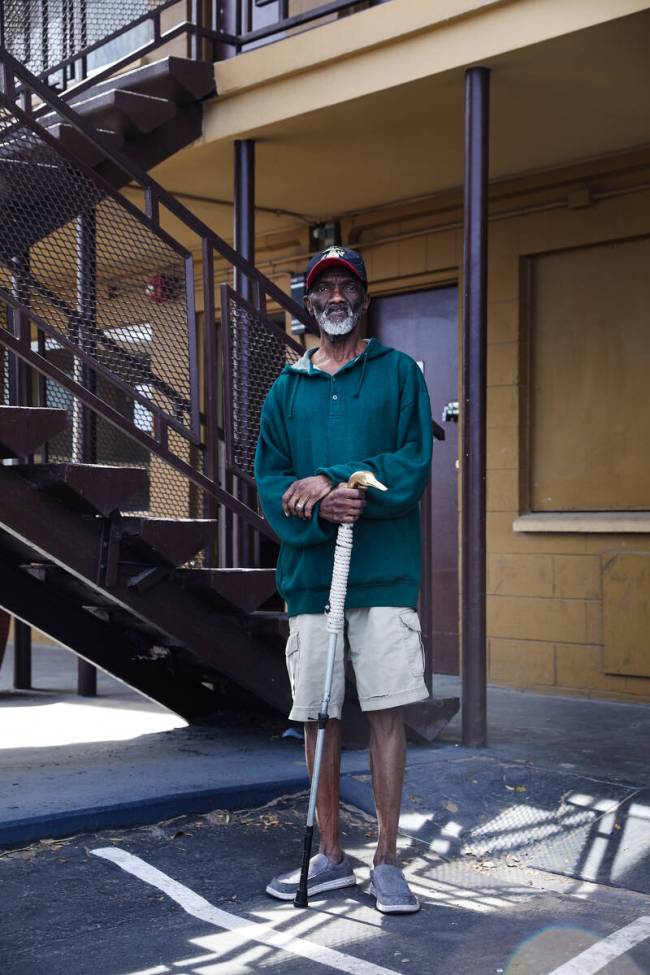
Formerly homeless, 65-year-old Marine veteran Timothy Thomas said he hopes to continue living in the converted motel, where he pays $725 per month for a studio with a kitchenette. The federal government, which subsidizes Thomas’ rent, recently informed him that rent would go up $50 when his lease expires in September.
“I’m in that economic situation where I’m limited; affordable comes first,” Thomas said as he clutched onto a duck-billed cane and gestured to the upstairs unit he has lived in for more than two years. “We need this.”
Tonjula Johnson, who also lives on the second floor, said she appreciated Stalk’s management of the building and that he had always been responsive to all her needs and concerns.
Though there are no longer plans to sell immediately, Stalk and Kelly said any proceeds from the sale would have been used to support other local nonprofits.
But leaders at U.S. Vets — one of the named organizations, which also houses clients at SHARE properties — said they were unaware of any such plans.
Exit at the flagship complex
Tenants at SHARE’s former flagship property have already experienced the uncertainty and apprehension that can follow the nonprofit’s departure.
Caridad, the nonprofit that took over operations and renamed the property Hebron, reported finding tenants’ medical records, car titles and hundreds of other documents left behind in the front office.
Residents there said they pay hundreds of dollars in rent monthly while cooking food on hot plates and washing dishes in their bathroom sinks.
“I would love to be able to have a real kitchen with a real sink, but you can’t find anything nowadays,” said Cecelia Knapp, an 80-year-old Navy veteran who has lived there since 2015.
At his first campus, it felt like Stalk “was running a private motel and not really a program,” Clark County Administrator of Human Services Tim Burch wrote in an October email to city of Las Vegas officials as he was trying to discern how many tenants there received government assistance.
Residents waited more than five months to get back their security deposits, which totaled more than $42,000 and were only returned after they obtained legal representation.
Stalk said the delay was the fault of property owner YSBM, which received a check containing the deposits in September.
“We’re fair and we’re honest, and every dollar was returned out of those tenant deposits,” Stalk said.
Michael Stein, YSBM’s attorney, said the check was returned to SHARE in November, months before it was finally dispersed to tenants.
“He abandoned the premises and then he tried to tell my client — that does nothing more than own the building — that they’re a landlord,” he said.
Many veterans at the complex also began to doubt Stalk’s commitment. Some said they tried to reach their former landlord shortly after he left but that Stalk told them their housing was no longer his responsibility.
Army veteran Robert Hollaway recalled that Stalk suddenly left “out the door” overnight.
“You can’t profess to care about people and then do something like that,” he said.
But Stalk maintains that every resident there was offered alternative housing by the county.
“I never abandoned it,” he said. “To say that you abandoned a resident is so reckless.”
‘Low-income housing business’
Veterans at the flagship building are not the first to question Stalk.
When SHARE was still called Veterans Village, a group of prominent Las Vegas veterans confronted Stalk and Kelly during a private meeting in 2019, stating that fewer than half of the residents were ex-military.
Army veteran Byron Brooks, now an elected regent for the Nevada System of Higher Education, said the group had received numerous complaints from veterans about their living conditions. Some alleged they faced eviction for being unable to cover the full rent amount, even though most of it was guaranteed through federal housing subsidies, according to Brooks.
“Veterans Village is nothing more than a low-income housing business,” Brooks said. “The fact that Arnold Stalk used the veteran name and flew this business under the veteran flag is what most veterans in the community find extremely egregious and offensive.”
The nonprofit later changed its name to SHARE, an acronym that stands for “supportive housing and resources for the elderly.”
Stalk said that Brooks felt slighted after he was not offered a job and that the nonprofit changed its name as part of its plan to expand its housing to non-veterans, not because of the confrontation.
However, another veteran at the meeting, retired Marine Clay Barber, echoed Brooks’ concerns.
“It was inferred several times that they were just kind of riding the coattails of the veteran name,” said Barber, who worked for the United Service Organizations nonprofit in Las Vegas at the time.
As of April, 63 veteran residents living at SHARE properties were receiving VA assistance, according to a spokesman. About 435 people live at the three locations, SHARE’s website states.
Stalk’s reputation in the community
Since SHARE’s beginnings in 1994, Stalk expressed a passion for ending homelessness. It earned him glowing praise from Las Vegas Mayor Carolyn Goodman in 2020, when she presented him with a key to the city.
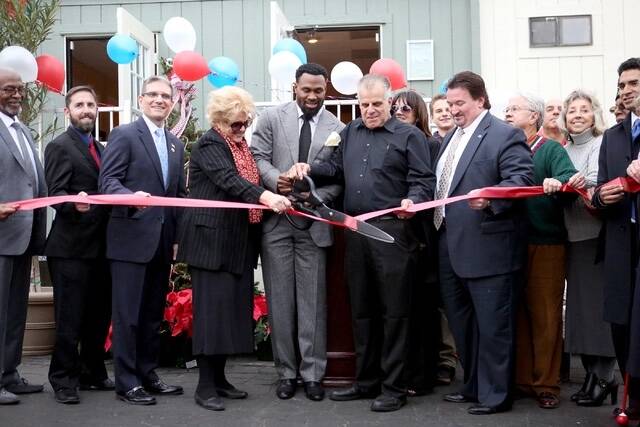
“This is a man who is so incredibly outstanding,” Goodman said. “Doing all the time something for somebody else.”
Ribbon cuttings at his Veterans Village complexes were attended by members of the City Council, casino executives and Nevada’s congressional delegation. In 2016, first lady Michelle Obama recognized him for his efforts.
Through a spokesman, the city of Las Vegas declined an interview for this story.
Stalk has consistently cited his housing background and expertise as a community advocate and boasted of helping hundreds of thousands of vulnerable Las Vegans. He holds a bachelor’s and master’s degree from The Southern California Institute of Architecture and has prominently claimed a Ph.D. in media coverage, on his LinkedIn profile and as part of the nonprofit’s branding.
However, it’s unclear if he received the doctorate, and LeGrand repeatedly ignored queries about it. The Review-Journal was unable to verify the advanced degree. SCI-Arc does not offer a doctorate.
Expert: Nonprofit ‘rife with red flags’
SHARE’s financial trajectory has markedly improved in the past five years, said CharityWatch Executive Director Laurie Styron.
In both 2019 and 2020, it reported more than $3 million in revenue, according to its latest federal tax filings. It also reported receiving more than $2 million in contributions and grants since 2016.
Among them are a $150,000 donation from the Raiders in 2018; $1 million in materials and labor for a facility at SHARE Village 2 designed by Wynn Las Vegas in 2017; and the remodeling of 10 apartments by the local carpenters union last year. In February, Renewal by Anderson installed new windows at SHARE Village 2 for the third time.
But some items in the financial reports raise serious questions about the nonprofit’s operations, said Styron, who reviewed the documents at the Review-Journal’s request. She noted that the records show SHARE does not have the most “basic governing policies,” such as policies addressing conflict of interest, document destruction or whistleblowers.
“This tax filing is just rife with red flags,” said Styron, an accountant whose organization investigates nonprofits. “It’s like having a puzzle where 80 percent of the pieces are missing.”
LeGrand said the charity has all three policies, despite the nonprofit reporting “No” to having each policy in annual tax filings dating back to 2014.
The nonprofit also does not appear to provide independent audited financial statements to the federal government, and its only listed board members are Stalk and his wife.
Stalk said he recently added a third member to SHARE’s board: his son, a freshman at UNLV.
LeGrand said his clients are “people of immense integrity” who don’t need the “bureaucratic claptrap” of an independent board of directors.
“You need that if you lack integrity,” he said.
He also said the charity is audited quarterly by its personal accountant, but he declined to provide a copy of any audits to the Review-Journal, citing concerns they would be published.
Disputes about repairs, renovation
When SHARE left its flagship property abruptly in September, its owner found the complex “in complete shambles,” said Stein, YSBM’s lawyer.
LeGrand claimed in court transcripts that his client spent more than $4 million in renovations. But YSBM’s lawsuit was settled shortly after the landlord demanded proof of the renovations, Stein said.
“He’s a big talker, but when we asked them for proof, that was the end of it,” he said.
Permit applications filed with the city show that just under $100,000 in work has been done at the building since 2011, when Stalk signed the first lease.
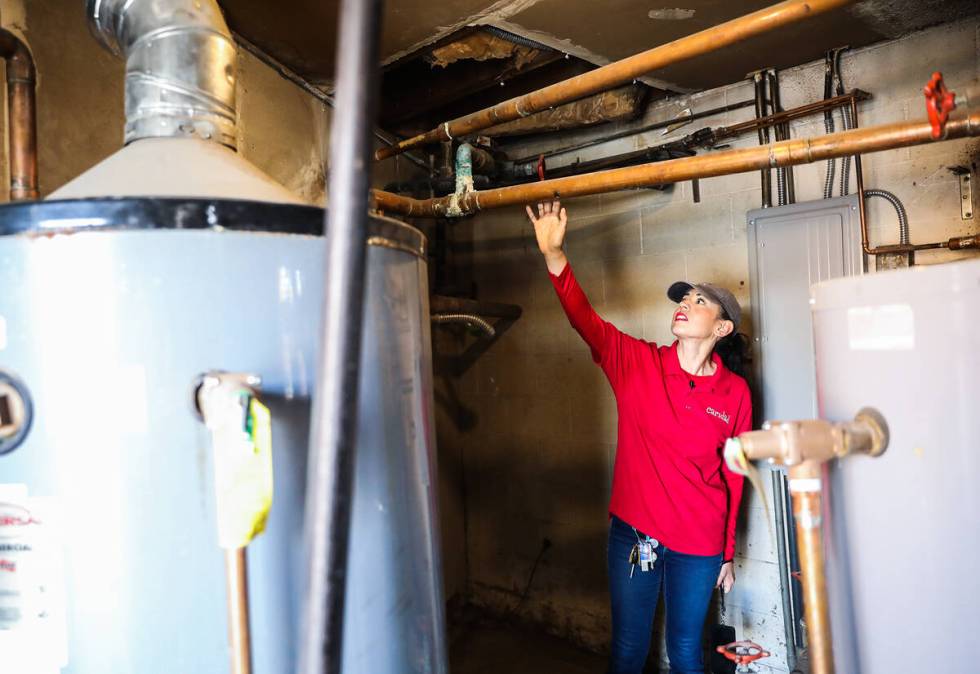
The Review-Journal toured rooms at the building earlier this year that contained moldy drywall, a doorframe with missing pieces and a bathroom with frozen and faulty valves. Workers found plywood glued to sinks, shower pipes leaking into neighboring rooms and a complex in need of water heaters and a new central air conditioning unit.
Caridad founder Merideth Spriggs provided receipts and repair quotes that totaled about $75,000 but estimated that it will cost hundreds of thousands more.
“If they really, really cared about the tenants in this place, why did they let it get so bad?” Spriggs asked.
SHARE said it had a full-time maintenance staff, with at least one person on-call 24/7. Agencies renting the units did thorough inspections before moving clients in, according to LeGrand, who, when asked about the building’s condition, pointed a finger at Caridad.
“SHARE HAS NO IDEA what has been done to maintain the property for the past 8 months,” he wrote in an email. “The facts are that Caridad signed off in November on the condition of the Property and is solely responsible for its condition today.”
But several residents said they had trouble getting repairs done under SHARE’s management.
The Nevada Attorney General’s Office received complaints in 2018 about SHARE Village 2 that described bedbugs and rodent droppings in the rooms. One complaint from a veteran read, “the LLC has ignored problems and is merely seeking to extract monies through heavy-handed tactics.”
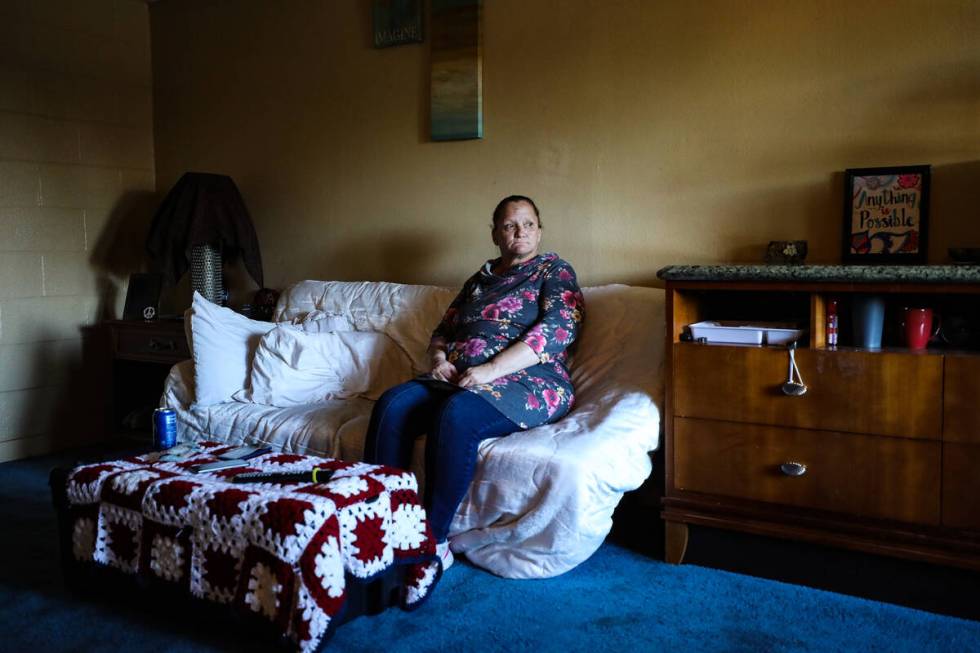
At SHARE Village 1, Angel Saavedra said her heater and air conditioner did not work, and that her toilet did not flush properly for more than a year.
At the same property, resident John Reaume said he “tolerated” water dripping from his bathroom ceiling for four years.
An ex-Air Force police officer, who spoke to the Review-Journal on the condition she not be identified, said her apartment at the flagship complex was littered with cockroaches and used razor blades when she moved in last August. Shortly after moving in, she tested positive for MRSA, a serious bacterial infection.But Navy veteran and resident Cynthia Kamaile Dias, 70, said she had no ill feelings toward Stalk and did not blame him for how he left.
“We’re not perfect; all of us have made mistakes,” she said. “Thank God I’m here. I was homeless, and Arnold gave me a place.”
Contact Briana Erickson at berickson@reviewjournal.com or 702-387-5244. Follow @ByBrianaE on Twitter.
The Review-Journal is owned by the Adelson family, including Dr. Miriam Adelson, majority shareholder of Las Vegas Sands Corp., and Las Vegas Sands President and COO Patrick Dumont. Sands Cares, the charitable arm of Las Vegas Sands, has donated money and goods to SHARE Village.



